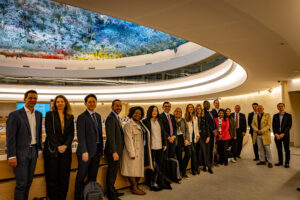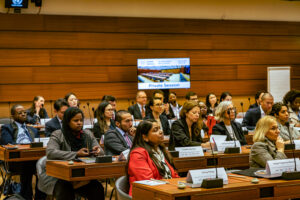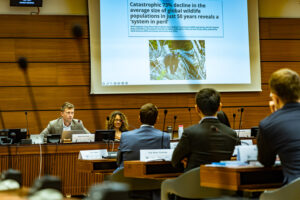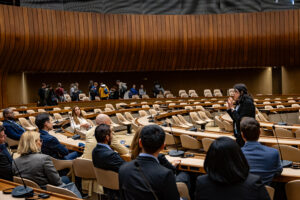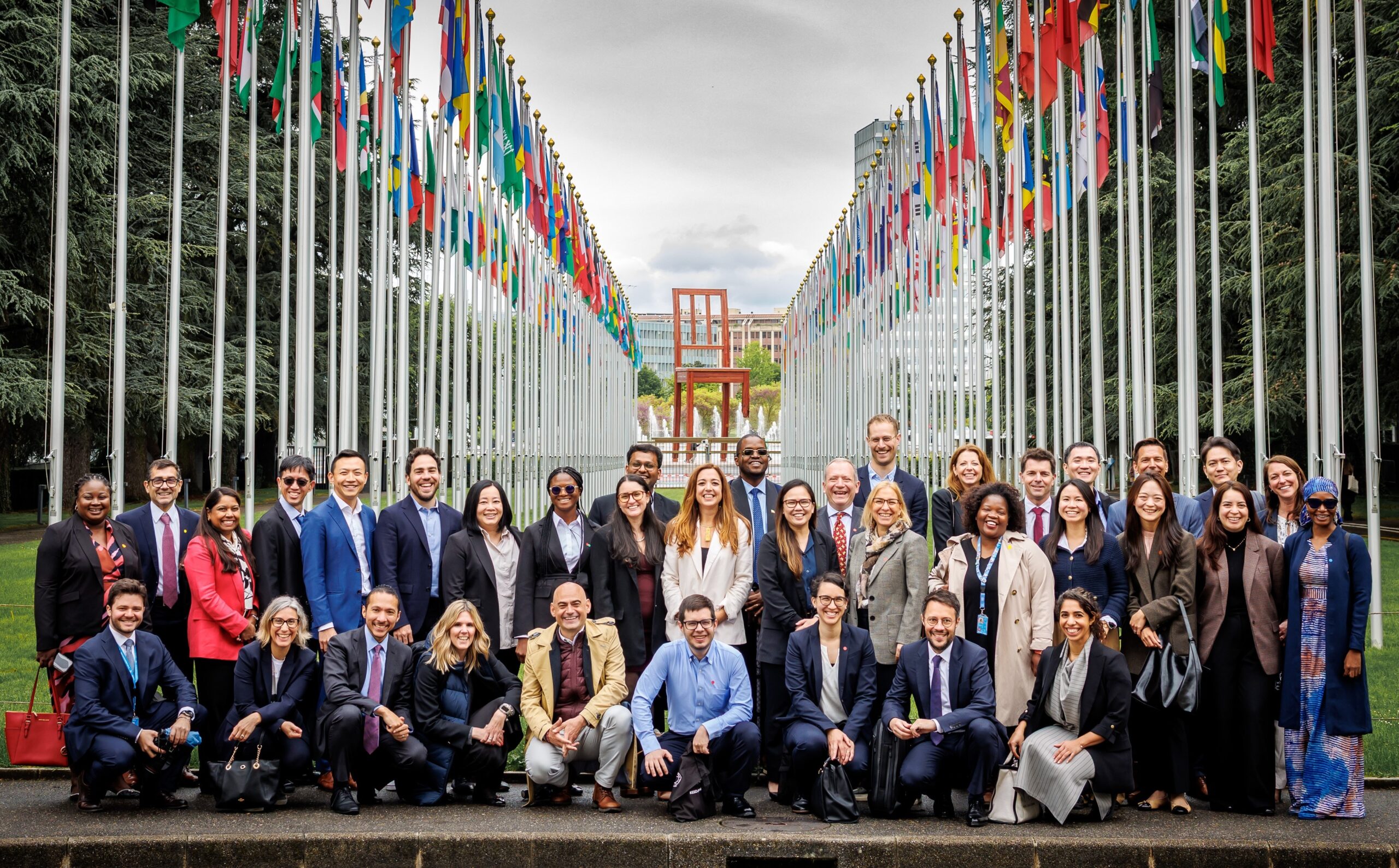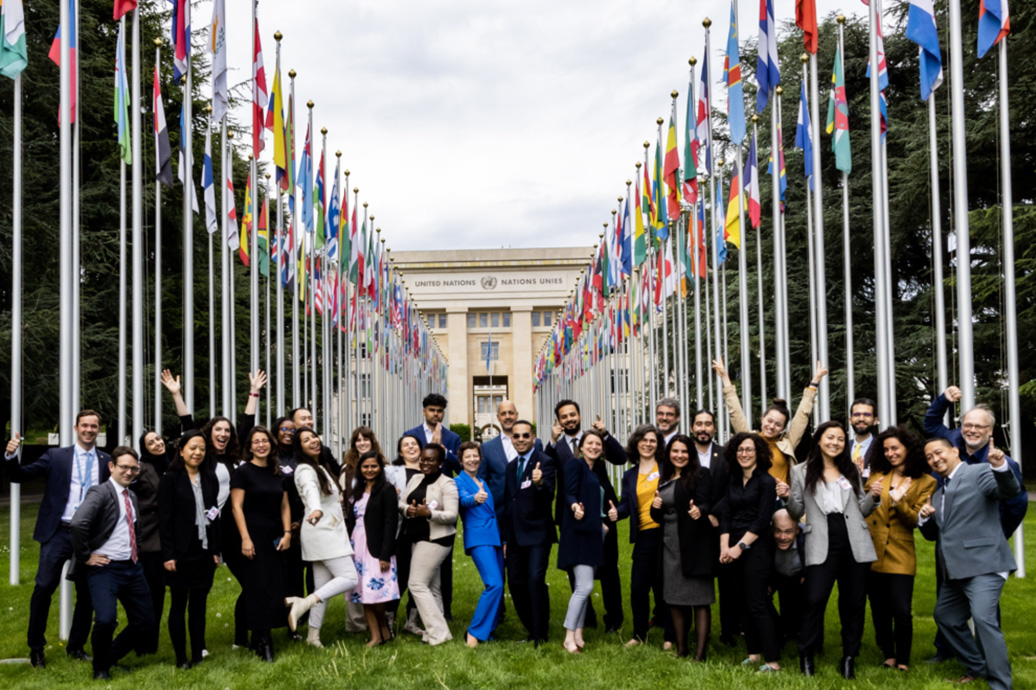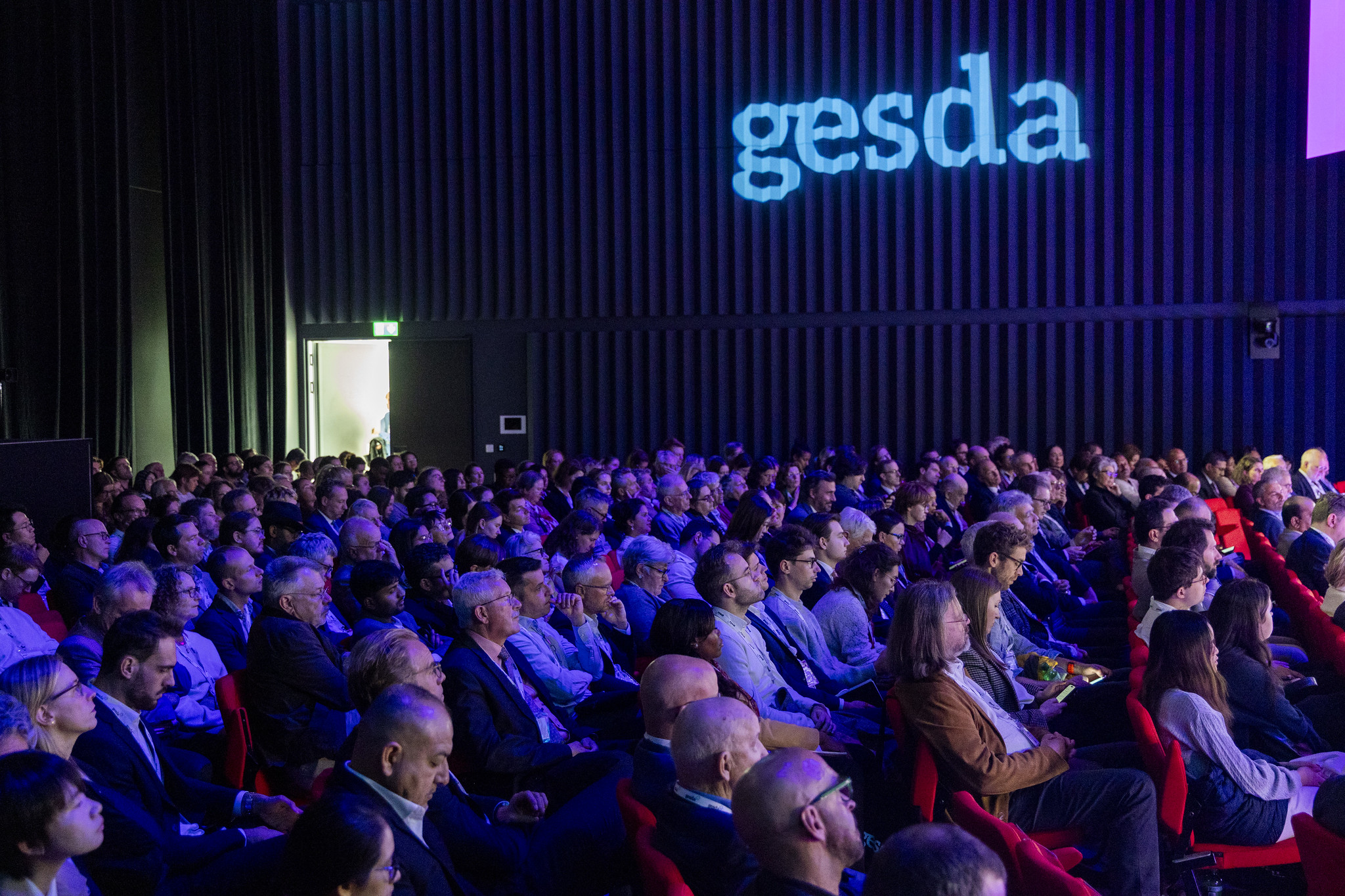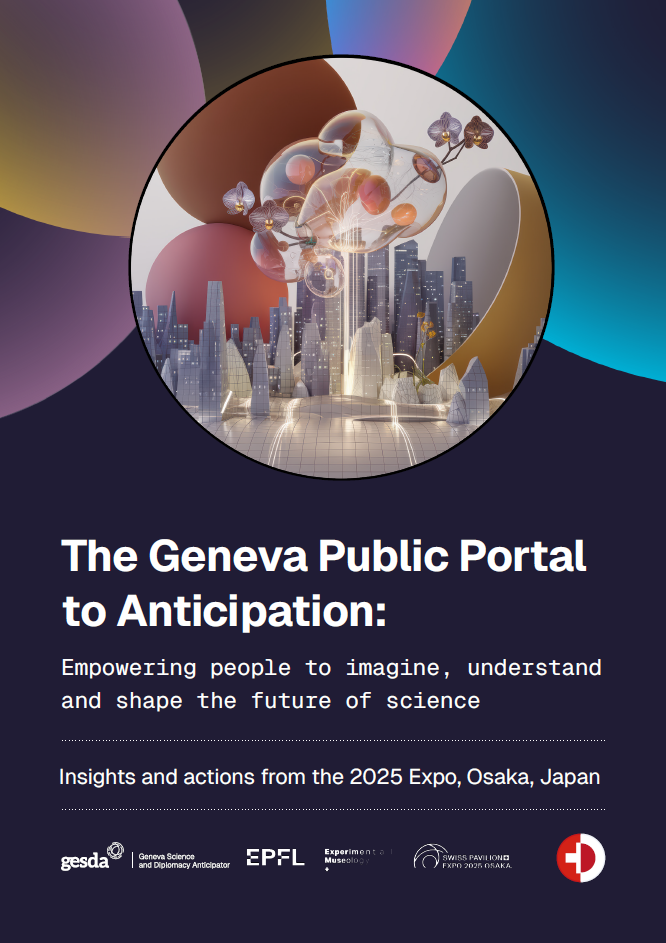GESDA welcomed 36 leaders to the fourth edition of its immersive learning and networking experience at International Geneva.
Inside the UN’s Palais des Nations, Daria Robinson greeted the new cohort and explained how Swiss and Geneva authorities created GESDA as a foundation in 2019 to launch anticipatory science diplomacy initiatives based in the city that serves as a global hub of multilateralism. “You are the new ambassadors for what we do. We’re scaling up and thinking at a whole new level,” said Robinson, GESDA’s Executive Director Solution Accelerator. “Our roles have been and should continue to be bringing comfort and discomfort to these discussions. That’s what will make the change. The best entrepreneurs are the intrapreneurs. You change the systems by bringing comfort and discomfort.”
Story by John Heilprin | Photos by Marc Bader/GESDA
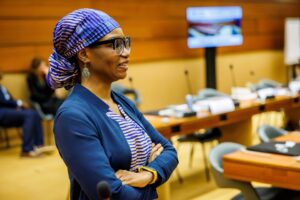 Marga Gual Soler, Head of Science Diplomacy Capacity Building for GESDA, who oversees the week-long program, noted that US and UK scientists first promulgated a modern definition of science diplomacy in 2010 and updated it this year since it keeps evolving. “GESDA is here to contribute what we think should be the next phase of science diplomacy,” she said.
Marga Gual Soler, Head of Science Diplomacy Capacity Building for GESDA, who oversees the week-long program, noted that US and UK scientists first promulgated a modern definition of science diplomacy in 2010 and updated it this year since it keeps evolving. “GESDA is here to contribute what we think should be the next phase of science diplomacy,” she said.
Participants learned from a session on “bridging mindsets” about the importance of considering both their individual and collective roles. “We live in a time where we have incredible scientific and technological breakthroughs and, at the same time, it’s critical that we manage those breakthroughs with wisdom and a clear understanding of what ‘good’ looks like for humanity,” said Nicolas Seidler, Executive Director, of the Geneva Science-Policy Interface.
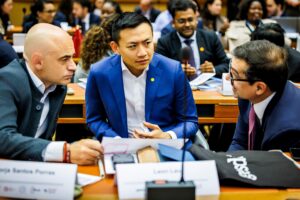
Multilateralism is under pressure from recent global budget cuts and geopolitical tensions in the past several years, he said, leading to more bilateral and regional agreements and power shifting from governments to global technology companies and other ‘non-state actors’ in science, technology and innovation, and in research and development. “There’s an open door for us to rethink how we develop alliances and partnerships within the UN and other multilateral organizations.”
Frédérique Guérin, Deputy Director of GSPI, described science diplomacy as a strategic process of building, negotiating and sustaining alliances between scientists and policymakers, on a national and international basis, with the aim of tackling complex global challenges. “A lot of you don’t fit into one box and that says a lot about the complexity of the world and the need for hybridity,” she said. “It’s a strength and it’s a necessity these days.”
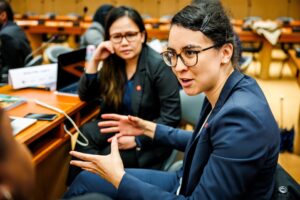
After a tour of the Palais des Nations, which is the UN’s European headquarters, Martin Müller, Executive Director Science Anticipation, introduced the GESDA Science Breakthrough Radar® that underpins GESDA’s work. The latest edition covers dozens of emerging scientific themes and hundreds of breakthroughs based on the insights of 2,100 scientists and experts from 87 countries, and the aim is to be increasingly more inclusive geographically.
“When we do anticipation, we try to refrain as much as possible from doing scenarios,” he said when asked to distinguish between anticipation and strategic foresight. “If you go into foresight, usually you have a handful of scenarios. We open up the space of possibilities, of complexity. The other notion is honest brokering. We try to bring in different visions of the world.”
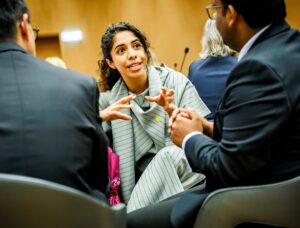
Some asked how the Radar’s success is measured and precisely how its impact is tracked. One question raised the “disconnect between innovation in the lab and in the real world,” an issue that GESDA is addressing with its Anticipation Observatory that will be discussed on Tuesday. “The fact that we are called more and more to advise with missions and ministry briefings is one measure that we are more and more in demand,” Müller said. Another way to track it, Robinson suggested, will be by examining the AI-generated public queries about the Radar.
Enrico Letta, the Chair of GESDA’s Diplomacy Forum, told the cohort remotely from Italy they can help spread a collective sense of agency through anticipation. “You have been selected for this program because you can drive effects on the ground and take back this anticipatory mindset and develop strategies and planning for your organizations and your countries,” said Letta, Dean of IE School of Politics, Economics & Global Affairs at IE University and former Prime Minister of Italy. “After this week you will join the growing community of practice GESDA is building in all geographies.”
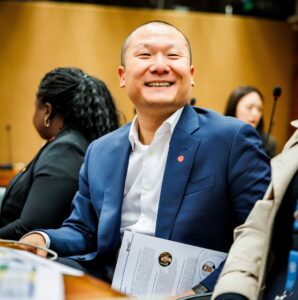
At an evening cocktail reception, GESDA’s new Director General, Professor Marilyne Andersen, welcomed the participants, telling them that despite the world’s rapid transformations, GESDA remains convinced that anticipatory, science diplomacy and multilateralism “can cultivate a renewed sense of shared purpose and agency.”
“You were chosen through a highly competitive process because of your potential to create impact on the ground. We trust that you will carry these anticipatory mindsets forward in your institutions and communities,” she said. “Throughout this week, you will get an exclusive, behind the curtain insights into the real world, real-time workings of diplomacy in Geneva.”
Michelle Gyles-McDonnough, UNITAR’s Executive Director, said the world is navigating “overlapping challenges and profound transitions,” including water scarcity, food insecurity, technological disruption, demographic shifts, and growing geopolitical complexity. “The institutions and tools of traditional diplomacy are being tested as we’ve never seen them tested before,” she said. “We must ensure these breakthroughs advance humanity equitably and do not divide, instigate fear or undermine trust.”

Maricela Muñoz, GESDA’s Director of External Affairs, moderated a panel discussion on how to bring about a more fit-for-purpose multilateral system. Ambassador Fancy Too, Permanent Representative of Kenya to the UN, emphasized the need for a transition to multipolarity that leaves no one behind and presses hybrid cooperation models and agility in addressing crises like climate change.
Garrett Levin, a Senior Policy Officer at the World Intellectual Property Organization, said there is “an appetite for information sharing, for learning from experts, for the kinds of forums that only multilateral institutions can provide.” Marcelo Cabrol, Chief of Scalability, Knowledge & Impact at the Inter-American Development Bank’s IDB Lab, said new ways of collaboration are needed among governments and multilateral organizations.
Ambassador Claudia Fuentes Julio, Permanent Representative of Chile to the UN in Geneva, said the multilateral system needs to demonstrate that it delivers so that citizens feel it is valuable. “Science is a great way forward,” she said. “Science is not a luxury anymore. I think we should be looking at it as a shared language for cooperation. We see here in Geneva that many decisions are shaped by science and technology.”
Photos By Michael Chiribau/UNITAR
